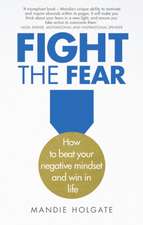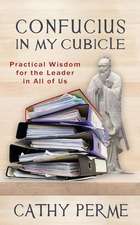How to Argue
Autor Jonathan Herringen Limba Engleză Paperback – 20 oct 2010
We all do it every day; arguing is part of life. We can do it unknowingly, sometimes subtly and sometimes very explosively, but however we do it, most of us know that we argue badly.
Imagine being able to face any argument free of the fear, confusion and intimidation that your opponent is probably experiencing. Imagine knowing that, win or lose, your argument has been made convincingly, confidently and without losing your temper.
In How To Argue you’ll learn all the golden rules of successful arguing and explore many of the situations in life and work where arguments are most likely to happen.
This is the definitive guide to how to argue persuasively, positively and powerfully - in any situation.
Preț: 60.63 lei
Nou
Puncte Express: 91
Preț estimativ în valută:
11.61€ • 12.61$ • 9.75£
11.61€ • 12.61$ • 9.75£
Carte disponibilă
Livrare economică 31 martie-14 aprilie
Livrare express 15-21 martie pentru 24.73 lei
Preluare comenzi: 021 569.72.76
Specificații
ISBN-13: 9780273734185
ISBN-10: 0273734180
Pagini: 240
Dimensiuni: 136 x 216 x 17 mm
Greutate: 0.36 kg
Ediția:1
Editura: Pearson Education
Locul publicării:Harlow, United Kingdom
ISBN-10: 0273734180
Pagini: 240
Dimensiuni: 136 x 216 x 17 mm
Greutate: 0.36 kg
Ediția:1
Editura: Pearson Education
Locul publicării:Harlow, United Kingdom
Cuprins
Contents
Each chapter will open with a cartoon and short humorous dialogue of an argument that has gone wrong.
Part One: How to Argue and The ten golden rules of argument
The first part of the book will look at the key principles and factors involved in arguments such as emotions, tone and pitch of voice, body language, aggression vs assertiveness, how to be understood etc.
It will then give you the ten golden rules (which will also be develop throughout the book in a variety of settings). These will emphasise the importance of listening to the other person and seeking to understand where they are coming from. They will be practical and of wide application.
Chapter 2: Emotional Arguments
It is, perhaps, argument with partners that cause the greatest difficulties in people’s life, although their resolution can be fun!! Nevertheless a relationship marked by bitter argument is unlikely to be fulfilling to anyone. This chapter will look at ways of how to take the heat out of the inevitable disagreements that occur in relationships.
Chapter 3: Arguments at Work
This chapter will focus on how to deal with situations where those who are in power or authority over you at work seek to impose their will on you. It will provide help that may protect you from being bullied or being the one who always ends up with the worse job.
Chapter 4: Returning the goods to the shop or complaining about service
This chapter will focus on situations where you are complaining about goods or services. This is a common situation which many people find themselves in, but one many people find hard to handle. This chapter will give some straight-forward practical advice on how to deal with the dreaded builder and the snobby sales assistant and advice on your basic consumer rights.
Chapter 5: How to get what you want from a professional
Many people find interactions with doctors (and other professionals) difficult. They do not feel they can say all they want to say, or express disagreement with those who are experts in a field. This chapter suggests ways that you can get your points across in a respectful way.
Chapter 6: How to Debate
Inevitably with friends issues arise where there is disagreement, be that over politics, morality or even religion. Sometimes discussions on such issues can lead to arguments and even ending of relationships. This chapter will look at how to avoid that. It is important to be able to disagree on issues with friends, but finding ways to argue about subjects such as politics in a fun way is an important skill in deepening friendship.
Chapter 7: Arguing with children
Tensions and arguments between parents and children can mar family life. Children need to learn how to resolve conflicts and parents have an important role in doing this. This chapter will provide some important tips on how settle disputes between you and your troublesome child.
Chapter 8: Arguing when you know you are in the wrong
Sometimes you have done wrong. You have parked on a double yellow line, or done something wrong at work. This can easily lead to arguments that can make the situations worse, rather than better. This chapter will consider what is the best way of dealing with a case where you are at fault, but where you desperately want to avoid too harsh a punishment.
Chapter 9: Arguing with a “walkover”
There is little more annoying than having an argument with someone who simply agrees with everything you say. Especially where you think they are not actually agreeing with you but simply saying they do in order to avoid “a scene”. This chapter will consider how to deal with those cases where you want to get your point across even though the person is agreeing with you all the time.
Chapter 10: Arguing again and again
Some people find that there are particular situations or particular people with whom they are constantly arguing. Or indeed they may find that they are simply constantly falling out with others. This is the chapter for them. It will teach you how to get avoid the pitfalls that so quickly lead to arguments. You might even begin to enjoy their company and grow in the relationship.
Chapter 11: How to be a good winner
Too often people will win an argument, but lose the friendship. That is no way to win an argument. Good arguing means not only reaching a satisfactory outcome for you, but also for the other person. Winning and lauding it over the other person will get you nowhere. This final chapter looks at how good arguing should lead to strengthening and not weakening the friendship. Even if the argument is with someone you are unlikely to meet again leaving them feeling defeated and bitter is unlikely to be productive.
Each chapter will open with a cartoon and short humorous dialogue of an argument that has gone wrong.
Part One: How to Argue and The ten golden rules of argument
The first part of the book will look at the key principles and factors involved in arguments such as emotions, tone and pitch of voice, body language, aggression vs assertiveness, how to be understood etc.
It will then give you the ten golden rules (which will also be develop throughout the book in a variety of settings). These will emphasise the importance of listening to the other person and seeking to understand where they are coming from. They will be practical and of wide application.
Chapter 2: Emotional Arguments
It is, perhaps, argument with partners that cause the greatest difficulties in people’s life, although their resolution can be fun!! Nevertheless a relationship marked by bitter argument is unlikely to be fulfilling to anyone. This chapter will look at ways of how to take the heat out of the inevitable disagreements that occur in relationships.
Chapter 3: Arguments at Work
This chapter will focus on how to deal with situations where those who are in power or authority over you at work seek to impose their will on you. It will provide help that may protect you from being bullied or being the one who always ends up with the worse job.
Chapter 4: Returning the goods to the shop or complaining about service
This chapter will focus on situations where you are complaining about goods or services. This is a common situation which many people find themselves in, but one many people find hard to handle. This chapter will give some straight-forward practical advice on how to deal with the dreaded builder and the snobby sales assistant and advice on your basic consumer rights.
Chapter 5: How to get what you want from a professional
Many people find interactions with doctors (and other professionals) difficult. They do not feel they can say all they want to say, or express disagreement with those who are experts in a field. This chapter suggests ways that you can get your points across in a respectful way.
Chapter 6: How to Debate
Inevitably with friends issues arise where there is disagreement, be that over politics, morality or even religion. Sometimes discussions on such issues can lead to arguments and even ending of relationships. This chapter will look at how to avoid that. It is important to be able to disagree on issues with friends, but finding ways to argue about subjects such as politics in a fun way is an important skill in deepening friendship.
Chapter 7: Arguing with children
Tensions and arguments between parents and children can mar family life. Children need to learn how to resolve conflicts and parents have an important role in doing this. This chapter will provide some important tips on how settle disputes between you and your troublesome child.
Chapter 8: Arguing when you know you are in the wrong
Sometimes you have done wrong. You have parked on a double yellow line, or done something wrong at work. This can easily lead to arguments that can make the situations worse, rather than better. This chapter will consider what is the best way of dealing with a case where you are at fault, but where you desperately want to avoid too harsh a punishment.
Chapter 9: Arguing with a “walkover”
There is little more annoying than having an argument with someone who simply agrees with everything you say. Especially where you think they are not actually agreeing with you but simply saying they do in order to avoid “a scene”. This chapter will consider how to deal with those cases where you want to get your point across even though the person is agreeing with you all the time.
Chapter 10: Arguing again and again
Some people find that there are particular situations or particular people with whom they are constantly arguing. Or indeed they may find that they are simply constantly falling out with others. This is the chapter for them. It will teach you how to get avoid the pitfalls that so quickly lead to arguments. You might even begin to enjoy their company and grow in the relationship.
Chapter 11: How to be a good winner
Too often people will win an argument, but lose the friendship. That is no way to win an argument. Good arguing means not only reaching a satisfactory outcome for you, but also for the other person. Winning and lauding it over the other person will get you nowhere. This final chapter looks at how good arguing should lead to strengthening and not weakening the friendship. Even if the argument is with someone you are unlikely to meet again leaving them feeling defeated and bitter is unlikely to be productive.
Textul de pe ultima copertă
The ability to persuade, influence and convince is a vital skill for success in work and life. However, most of us have little idea how to argue well. Indeed, arguing is still seen by many as something to be avoided at all costs, and mostly it’s done really badly – or not at all. Yet it’s possibly the most powerful and yet most neglected asset you could have.
Discover the art of arguing powerfully, persuasively and positively and you’ll have a head start every time you want to:
In How to Argue, leading lawyer, husband and father Jonathan Herring reveals the secrets and subtleties of making your case and winning hearts and minds. At home or at work, you’ll be well equipped to make everything you say have the desired effect, every time.
Discover the art of arguing powerfully, persuasively and positively and you’ll have a head start every time you want to:
- Put your point across effectively
- Persuade other people to your way of thinking
- Keep your cool in a heated situation
- Win people over
- Get what you want
- Tackle a difficult person or topic
- Be convincing and articulate
- Have great confidence when you speak
In How to Argue, leading lawyer, husband and father Jonathan Herring reveals the secrets and subtleties of making your case and winning hearts and minds. At home or at work, you’ll be well equipped to make everything you say have the desired effect, every time.
















